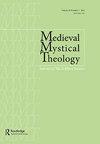An Introduction from the Editor of Medieval Mystical Theology
IF 0.3
0 RELIGION
引用次数: 0
Abstract
Welcome to volume 30, issue 2 of Medieval Mystical Theology. Our essays in this issue concern very different topics within the field of mystical theology, and yet each deliberately draws from classic works in a manner that highlights the ways they each continue to influence. In this respect, the essays are not merely orientated historically, but have a hermeneutic focus designed to reveal sustained truths that are relevant now. The first essay by Valentin Gerlier is titled, ‘Nature Conversing: John Scotus Eriugena’s Contemplative Ontological Poetics’. Inspired by Willemien Otten, the essay considers the importance of nature understood as conversation in John Scotus Eriugena’s master-work, Periphyseon, and how this might provide a significantly different approach in response to our current ecological crisis. Gerlier discusses how this all-encompassing take on nature is contemplative and creative and leads to a cosmic practice where the natural and human world encounter one another, in a wider context that leads to the well-being and flourishing of all things in God. The second essay by Maria L. Highton is titled, ‘If we cannot know it all, why know at all? Exploring, through Thomas Aquinas and Nicholas of Cusa, the reason why God cannot be named’. Here Highton draws from Aquinas’ Summa Theologiae and Cusa’s On Learned Ignorance, with a view to exploring how it is we might approach a knowledge of God akin to the knowledge He has of Himself without naming Him. Consequently, we learn how simplicity and analogy can bring us to such divine perfection. Our third essay by Bernard McGinn is titled, ‘Niht Enwil Und Niht Enweiz Und Niht Enhât: Eckhart’s Triple Negation and its History’. This is the second part of a two-part essay that began in our previous issue. This is a special essay to celebrate what was in 2020 the tenth anniversary of the journal in its new form as, Medieval Mystical Theology. Based on Meister Eckhart’s famous German Sermon 52, it looks at his formula consisting of the three negations: not willing, not knowing, and not having. Where the first part of this essay offered a comparison of Marguerite Porete and Eckhart on this formula, this second part follows the formula through German, Dutch, French, Italian, and Spanish mystical traditions. Our final essay is by Tatyana Solomonik-Pankrashova and is titled, ‘The “Ventriloquism” of Logoi in the Old English Prose Psalms and “Boethius”’. This essay focuses on the Old English Boethius, a translation/adaption of the Consolation of Philosophy by Boethius. Solomonik-Pankrashova analyses the significance of the many voices in interpretation which, in terms of creativity, makes the work more than mere imitation. Accordingly, she elicits rich philosophical and theological meanings in the Old English Boethius.《中世纪神秘神学》编辑简介
欢迎收看《中世纪神秘神学》第30卷第2期。我们在本期的文章涉及神秘神学领域中非常不同的主题,但每一篇文章都有意借鉴经典作品,强调它们各自继续影响的方式。在这方面,这些文章不仅以历史为导向,而且以解释学为重点,旨在揭示与现在相关的持续真理。Valentin Gerlier的第一篇文章题为《自然对话:约翰·斯科图斯·埃里乌格纳的沉思本体论诗学》。受Willemien Otten的启发,这篇文章考虑了John Scotus Eriugene的大师作品《Periphyseon》中被理解为对话的自然的重要性,以及这可能如何为应对我们当前的生态危机提供一种截然不同的方法。Gerlier讨论了这种对自然的全面理解是如何沉思和创造性的,并导致了一种宇宙实践,在这种实践中,自然世界和人类世界在更广泛的背景下相遇,从而导致上帝万物的幸福和繁荣。玛丽亚·L·海顿的第二篇文章的标题是,“如果我们不能全部知道,为什么还要知道呢?”?通过托马斯·阿奎那(Thomas Aquinas)和库萨的尼古拉斯(Nicholas of Cusa)探索上帝无法命名的原因。在这里,海顿借鉴了阿奎那的《神学概论》和库萨的《论习得的无知》,以期探索我们如何在不点名的情况下接近上帝的知识,类似于他对自己的知识。因此,我们学会了简单和类比如何将我们带到如此神圣的完美。Bernard McGinn的第三篇文章题为“Niht Enwil Und Niht Enweiz Und Night Enhât:Eckhart的三重否定及其历史”。这是我们上一期开始的一篇由两部分组成的文章的第二部分。这是一篇特别的文章,旨在庆祝2020年该杂志以新形式《中世纪神秘神学》出版十周年。根据Meister Eckhart著名的德国Sermon 52,它研究了由三个否定组成的公式:不愿意、不知道和不拥有。本文的第一部分对Marguerite Porete和Eckhart在这个公式上进行了比较,而第二部分则通过德国、荷兰、法国、意大利和西班牙的神秘传统来遵循这个公式。我们的最后一篇文章是由Tatyana Solomonik Pankrashova撰写的,题目是“古英语散文《诗篇》和《波提乌斯》中洛吉的“腹语术””。本文主要研究古英语《哲学的慰藉》的翻译和改编。Solomonik Pankrashova分析了许多声音在诠释中的意义,从创造力的角度来看,这些声音使作品不仅仅是模仿。因此,她在古英语《波依修斯》中引出了丰富的哲学和神学意义。
本文章由计算机程序翻译,如有差异,请以英文原文为准。
求助全文
约1分钟内获得全文
求助全文

 求助内容:
求助内容: 应助结果提醒方式:
应助结果提醒方式:


